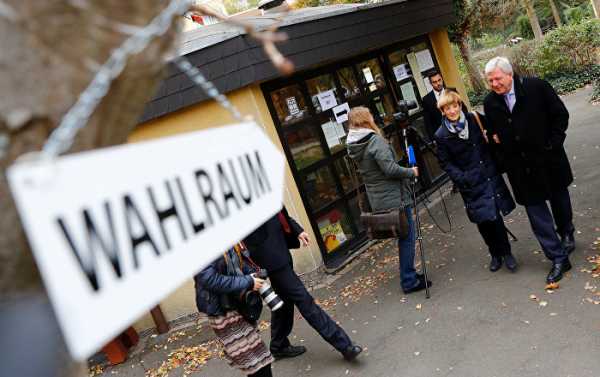
Just two weeks after Angela Merkel’s Christian Social Union allies witnessed their worst election results in decades in Bavaria, her own Christian Democrats are experiencing déjà vu in Hesse’s regional vote. Meanwhile, the anti-establishment Alternative for Germany has entered the last of the 16 state parliaments.
German Chancellor Angela Merkel’s Christian Democratic Union (CDU) has scored 27% of the vote in the state election in Hesse, as the preliminary tally indicates. Although the party could keep the majority in the state parliament (Landtag), this result is 11.3 points less than its performance there in 2013. The base of Germany’s second major political party and the CDU’s federal coalition partner, the Social Democrats (SPD), has also shrunk by nearly 11 percent since Hesse’s last election five years ago. The party received a mere 19.8% of the vote in a state they once considered their stronghold, which has a population of over 6 million people and is home to Frankfurt am Main, one of Europe’s largest financial centers.
The Greens, who have governed Hesse in coalition with the CDU over the last 5 years, were neck-and-neck with the SPD, also securing 19.8% of the vote. Meanwhile, the anti-establishment Alternative for Germany party, which advocates a stricter migration policy, has entered Hesse’s Landtag for the first time with 13.1% of the vote and now holds seats in all of Germany’s regional parliaments.
SPD and CDU’s State Election Deja Vu
Hesse’s election has mirrored the Bavarian state vote, held just two weeks ago, which brought big gains for the Greens and AfD, but dealt a sensitive blow to the CDU’s Bavarian sister party, the Christian Social Union (CSU), as well as the SPD. The CSU, led by German Interior Minister Horst Seehofer, lost 10 percent in comparison with the 2013 election and scored its worst result in 50 years, which was branded “painful” and “bitter” both by the CSU and CDU.
The SPD’s results showed the same dynamics, as the party attracted 10 percent fewer voters than in 2013. The party blamed its problems on federal-level politics, as SPD leader Andrea Nahles stated that the performance of the CDU/SPD grand coalition was one of the reasons for the crash and claimed that it was “clear that something has to change.”
Following the Bavarian election, some politicians noted that it was “a clear signal to Berlin.” Speculations in the German media arose that the results in Hesse could undermine Merkel’s government in Berlin and even shatter her position ahead of her expected reappointment as the head of the CDU in December.
‘Unacceptable:’ Alarm in SPD-CDU Coalition
The dismal results in Hesse have fueled alarmed rhetoric on both sides. The SPD’s Nahles has hastened to claim that “the state of the government is unacceptable.” She announced that the SPD would press Merkel’s governing coalition to accept “a clear, binding timetable” for the government’s projects. She also reminded about the midterm review next fall, which is to reveal if “we are still in the right place in this government.”
The leader of the SPD youth organization Juso, Kevin Kühnert, was more categorical, stating that “on conditions under which we work here in Berlin, the SPD will not get a foot on the ground in any state… Any little fire can make it explode.”
The CDU’s General Secretary Annegret Kramp-Karrenbauer echoed Nahles’ promises, stating that the coalition must identify “three concrete projects for the coming months that we implement.”
The SPD and the CDU/CSU bloc struck a coalition agreement amid fierce debates among the Social Democrats half a year after Germany held parliamentary elections in September 2017. Merkel initially planned to form a coalition with the Greens and the FDP, but preliminary talks with them were unsuccessful, so the CDU/CSU had to court the Social Democrats.
Sourse: sputniknews.com






